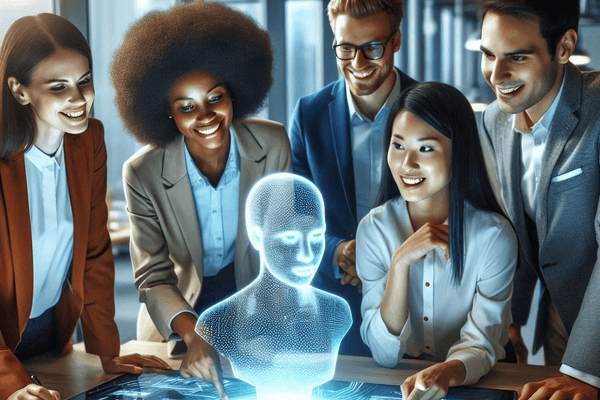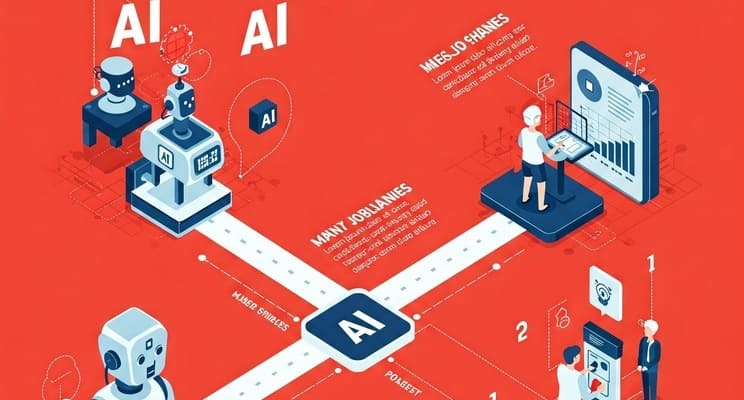The way we work is undergoing a dramatic transformation, with artificial intelligence (AI) playing a central role in reshaping industries. From automating repetitive tasks to enhancing decision-making, AI is redefining job roles, skills, and workplace dynamics. Companies that harness AI’s potential gain a significant competitive edge, while workers must adapt to stay relevant in an AI-driven future.

Automation & AI-Driven Efficiency
AI is streamlining business operations by handling repetitive, time-consuming tasks. This shift allows human workers to focus on strategic and creative work rather than mundane activities. AI-driven automation also improves accuracy, reducing human errors in data processing. Businesses benefit from real-time data analysis, enabling faster and more informed decision-making. Increased efficiency and productivity make AI a crucial asset in today’s fast-paced economy. According to McKinsey, AI-driven automation could increase productivity by up to 40% in some industries.
AI in Manufacturing & Robotics
Manufacturing has embraced AI through smart factories and robotics. AI-powered machines perform precision tasks with minimal errors, increasing production efficiency. The adoption of AI in manufacturing is expected to grow by 57% between 2022 and 2027. Predictive maintenance, a game-changer in industrial settings, helps prevent unexpected equipment failures, reducing downtime and maintenance costs by 10-40%. AI-driven logistics and supply chain management further optimize production processes, ensuring seamless operations.
AI in Healthcare & Medicine
AI is revolutionizing healthcare by enhancing diagnostics, treatment, and patient care. AI-driven diagnostic tools analyze medical images and patient records to detect diseases with remarkable accuracy—30-40% more accurate than human doctors in some cases. Personalized treatment plans, based on AI’s deep analysis of patient data, improve patient outcomes. Robotic-assisted surgeries offer greater precision, reducing risks and recovery time. Additionally, AI accelerates drug discovery and vaccine development, with the AI healthcare market projected to reach $187 billion by 2030.
AI in Finance & Banking
The financial sector leverages AI to enhance security, efficiency, and customer service. Real-time fraud detection systems analyze patterns to prevent cyber threats, reducing fraud losses by 30-50%. AI-powered chatbots handle 80% of routine banking inquiries, improving response times by 60%. Automated trading utilizes AI algorithms to predict market trends and make informed investment decisions. AI also streamlines loan approvals and risk assessments, improving financial accessibility.

AI in Retail & E-Commerce
Retailers and e-commerce businesses use AI to create personalized shopping experiences. AI analyzes customer preferences and purchase history to recommend products tailored to individual tastes, increasing sales by 35%. Chatbots and virtual assistants enhance customer support by handling queries efficiently. AI-driven inventory management prevents stock shortages and optimizes supply chains, reducing shortages by 30%. Automated checkout systems, including cashier-less stores, improve customer convenience and reduce waiting times.
AI in Education & Upskilling
Education is evolving with AI-powered platforms that offer personalized learning experiences. Virtual tutors and AI-driven assessments provide customized guidance for students, improving retention rates by 25-60%. AI helps organizations identify skill gaps in the workforce, enabling targeted upskilling programs. The hiring process benefits from AI-driven recruitment tools that assess candidates efficiently, ensuring a better job fit. By 2025, 50% of all employees will need reskilling due to AI-driven job shifts.
The Rise of AI-Powered Customer Service
Customer service is experiencing a major shift with AI-driven solutions. Chatbots and virtual assistants provide round-the-clock support, reducing response times and improving customer satisfaction. AI-driven predictive analytics allow businesses to anticipate customer needs and personalize interactions. Businesses using AI in customer service see a 20-30% increase in customer satisfaction, and by 2025, AI chatbots are expected to handle 95% of customer interactions.
AI and the Evolution of Remote Work
The rise of remote work has been accelerated by AI-powered collaboration tools. AI automates scheduling, meeting transcriptions, and workflow management, making virtual teamwork seamless. AI-driven recruitment tools assess remote job candidates effectively, ensuring the best talent is hired—60% of companies now use AI-driven hiring tools for remote candidates. Virtual AI assistants further enhance employee productivity by managing tasks and providing real-time assistance, improving team productivity by 20-30%.
AI’s Impact on Job Roles & Workforce Skills
AI is shifting the focus of job roles from manual tasks to strategic problem-solving. The demand for skills in AI, data science, and automation is growing rapidly, with jobs in AI and machine learning increasing at a rate of 74% annually. Employees must embrace continuous learning and upskilling to stay relevant in an AI-driven workplace. While automation replaces some jobs, it also creates new opportunities—AI is projected to create 97 million new jobs by 2025 while transforming existing roles.
The Future of AI in the Workplace
AI will continue to drive innovation and efficiency across industries. 83% of businesses say AI is a strategic priority for their growth. Companies that invest in AI training and ethical implementation will gain a competitive advantage. AI is projected to contribute $15.7 trillion to the global economy by 2030. Adapting to AI-driven changes is crucial for long-term success. Organizations that embrace AI transformation will shape the future of work and redefine how businesses operate.
Key Takeaways & Action Plan
AI is not just automating jobs but also creating new opportunities, especially in technology-driven fields. Routine and repetitive tasks are being delegated to AI, allowing humans to focus on creative and strategic endeavors. The key to thriving in this new era is human-AI collaboration. Upskilling and adaptability will be essential for workers aiming to stay ahead in an AI-powered world.





